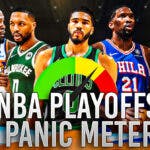Just over a year ago, Jayson Tatum was on top of the world. He was one of the brightest young stars in the NBA, he was coming off of a terrific playoff run and he had just posterized LeBron James.
As a result, the hype surrounding Tatum heading into the 2018-19 campaign was insane, if not a bit unfair. Everyone was expecting the then-20-year-old kid to average 20 points per game and help lead the Celtics to a finals appearance.
Instead, Tatum averaged a much more modest 15.7 points per game, and Boston was eliminated from the second round of the playoffs.
The funny thing is, Tatum actually had a fine season. In addition to his scoring output, he registered six rebounds, 2.1 assists and 1.1 steals over 31.1 minutes per game while shooting 45 percent from the floor, 37.3 percent from three-point range and 85.5 percent from the free-throw line.
For a 20-year-old who would go on to turn 21 in March, those are actually pretty darn good numbers.
But because lofty expectations were already set, fans and media pundits bemoaned Tatum's second season rather than praising it.
That's not to say he was great, because there were certainly moments where Tatum showed his youth and even disappeared for stretches, but all in all, he had a pretty good year.
And all of that came with a ridiculously dysfunctional locker room that probably rivaled the 1978 Yankees. Kyrie Irving hated the young players, the young players hated him, Gordon Hayward was taking some guys' minutes, Terry Rozier was unhappy with his playing time, free agency loomed for a significant portion of the roster…you name it, and it happened.
But now, Irving is gone, so a star, ball-dominant point guard who was also a toxic locker room presence is no longer impeding Tatum.
As a result, Tatum should flourish.
Part of the reason why Jayson Tatum did not break out in the fashion that many had hoped this past year was because of a largely undefined role, and let's be honest: some of that falls on head coach Brad Stevens as much as it does on Irving.
While Irving was clearly the No. 1 option night in and night out, the Celtics didn't really have a clear-cut No. 2. Part of that was because they had a roster full of those types of guys, which made it difficult to simply designate one.
So, Tatum scuffled between being a No. 2 guy and sometimes a No. 4 or 5 depending on how the night was going, and that is not easy for any scorer, let alone one playing in just his second NBA season.
There were nights where Tatum would show flashes of his 2018 playoff dominance, and then there were nights where he was a virtual non-factor, looking lost in the headlights of what was a topsy-turvy Celtics offense that was ridiculously talented to a fault.
Now, to be fair, inconsistency is to be expected from a 20-year-old, which is why I think people are making too big of a deal out of his “struggles” this past year. He really wasn't bad at all. But, again, expectations.
It also didn't help that Jayson Tatum looked wise beyond his years in Game 7 of the Eastern Conference Finals against the Cleveland Cavaliers last spring, going toe-to-toe with LeBron with both Irving and Hayward looking on from the bench in street clothes.
Obviously, getting both Irving and Hayward—two All-Stars who are also 20-point-per-game scorers—back into the lineup threw a wrench into things for the entire team, and Tatum was one of the most adversely affected parties.
Perhaps we all overlooked the “only one ball” cliche when it came to the Celtics simply because they looked so phenomenal without Kyrie and Hayward that we all just assumed that once they got those two stars back, they would be an impossible puzzle.
Turns out, they were an impossible puzzle, alright, but for themselves to figure out rather than their opponents.
So maybe we shouldn't be surprised that Tatum had such an up-and-down year, and when you take into account the relationship that Irving reportedly had with what he apparently felt were the inferior younger players on the team, you can understand why Tatum may have labored through parts of the season.
But now that Irving is playing in Brooklyn, Tatum should have a heck of a lot more freedom offensively and should be able to assert himself as one of the the clear top three options on the team along with Hayward and Kemba Walker.
Also, let's remember that the Celtics didn't just lose Irving and Al Horford this summer. They also lost Marcus Morris, Terry Rozier and Aron Baynes. They lost five key members of the rotation, so there will be a ton of roster turnover here.
And of those five players, four of them could have been seen as higher offensive options than Tatum on any given night. Now, that list is much, much smaller, as the pecking order probably goes something like Walker/Hayward/Tatum followed by Jaylen Brown and Enes Kanter.
There should not be nearly as much confusion in Beantown during the 2019-20 campaign, and Jayson Tatum should get back on the superstar track as a direct result.




